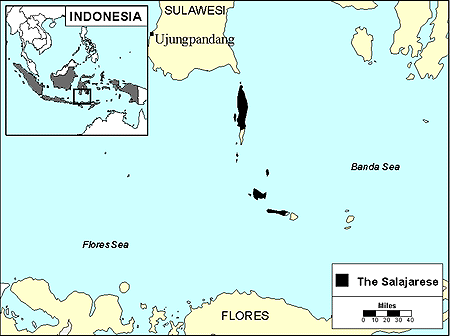|
|
Prayer Profile
The Salarjarese of Indonesia
![[IMAGE]](../images5/0774.jpg) Indonesia is the world's fourth most populous nation and continues to grow rapidly. It has one of the most ethnically diverse populations, with more than 300 distinct people groups, many of whom are Muslim. Indonesia is located in southeast Asia and consists of more than 3,000 islands. These islands are the principal link between the Pacific and Indian Oceans.
Indonesia is the world's fourth most populous nation and continues to grow rapidly. It has one of the most ethnically diverse populations, with more than 300 distinct people groups, many of whom are Muslim. Indonesia is located in southeast Asia and consists of more than 3,000 islands. These islands are the principal link between the Pacific and Indian Oceans.
The Salajarese live primarily on the island of Salajar, which is located southeast of the Sulawesi peninsula. They are reported to be very similar in culture and lifestyle to their neighbors, the Buginese. In fact, many scholars do not differentiate between the Salajarese and the Buginese. However, the Salajarese language, called Selayar, is more similar to the language of the Makassarese, who are also near neighbors. In the past, the Salajarese were known for their piracy and slave trading. Today, most of them are either farmers or fishermen.
What are their lives like?
The inland Salajarese are primarily farmers. Maize is their staple crop; grain and dry rice are secondary crops. Coconuts and lemons are cash crops that are exchanged for other necessary items. Fishing is the main occupation for those living on the coast. Sea cucumbers, turtles, and shellfish comprise part of their catch.
There are very few Salajarese villages. Homes tend to be scattered around the various farming areas. Most homes have plank walls with thatched roofs. Each house contains a kitchen, a porch, and bedrooms. They are usually built up on stilts. The average household consists of a nuclear family. Often when relatives do not possess a house, they will live with their close relatives. Children are raised by their parents, elder siblings, and other relatives or household members.
The island of Salajar is divided into regions, some of which are ruled by women. Regalia (sacred emblems) represent each region. There are a number of subtle social classes evident, including the descendants of rulers, nobility, commoners, and slaves.
In general, the division of labor is strict because of the rigid separation of sexes in everyday life. In agriculture, men do the hard work, such as plowing and carrying the farm produce. Traditionally, women tend to most of the harvesting, in addition to the traditional household duties.
In the rural locations, marriages are still arranged exclusively by the parents or close relatives. Traditionally, the groom's social rank must be equal to or higher than that of the bride. Marriages between second cousins are preferred among the commoners; while only nobles are allowed to marry first cousins. This is in order to retain the nobility and wealth within the close family. The "bride price" is divided into "spending money," which is used by the bride's family to cover the costs of the wedding feast, and a "rank price," which is given to the bride. If the groom's family cannot afford to pay an acceptable bride price, the couples often elope.
Intermarriage between villages tends to be the rule. This has resulted in complex, widespread kinship networks. Social rank among the Salajarese is established by the rank of ancestors.
What are their beliefs?
Islam has been the dominant religion among the Salajarese since the seventeenth century. Today, virtually all of the Salajarese are Sunni Muslims. However, animistic beliefs (belief that non-living objects have spirits) are still prevalent. The belief that all things in nature have souls strongly influences their daily lives and religious practices.
What are their needs?
Of the 111,000 Salajarese of Indonesia, only three percent are Christian. There is currently only one missions agency working among this people group. There is a great need for Christian broadcasts and literature to be made available in their own language.
Prayer Points
- Pray that the doors of Indonesia will soon be opened to missionaries.
- Ask the Lord to call additional long-term workers to go to the island of Salajar and share Christ with the Salajarese.
- Pray that God will raise up an army of intercessors who will faithfully stand in the gap for the Salajarese.
- Ask the Holy Spirit to encourage, strengthen, and protect the small number of Salajarese Christians.
- Pray that God will soften the hearts of the Salajarese towards the Gospel message.
- Take authority over the spiritual principalities and powers that have kept the Salajarese bound for many generations.
- Pray that God will reveal Himself to these precious people through dreams and visions.
- Ask the Lord to raise up strong local churches among the Salajarese.

Statistics
Latest estimates from the World Evangelization Research Center.
THE PEOPLE
- People name: Salajarese
- Country: Indonesia
- Their language: Selayar
- Population:
- Largest religion:
- Christians: 3%
- Church members: 3,329
- Scriptures in their own language: None
- Jesus Film in their own language: None
- Christian broadcasts in their own language: None
- Mission agencies working among this people: 1
- Persons who have heard the Gospel: d33,300 (30%)
- Persons who have never heard the Gospel: 77,700 (70%)
THEIR COUNTRY
- Country: Indonesia
- Population:
- Major peoples in size order:
- Major religions:
- Number of denominations: 113
© Copyright 1997
Bethany World Prayer Center
This profile may be copied and distributed without obtaining permission
as long as it is not altered, bound, published
or used for profit purposes.
![[HOME BUTTON]](../graphics/home.jpg)
![[CALENDAR BUTTON]](../graphics/calico.jpg)
![[LIST BUTTON]](../graphics/listico.jpg)
[Home]
[Calendar]
[Country List]
|